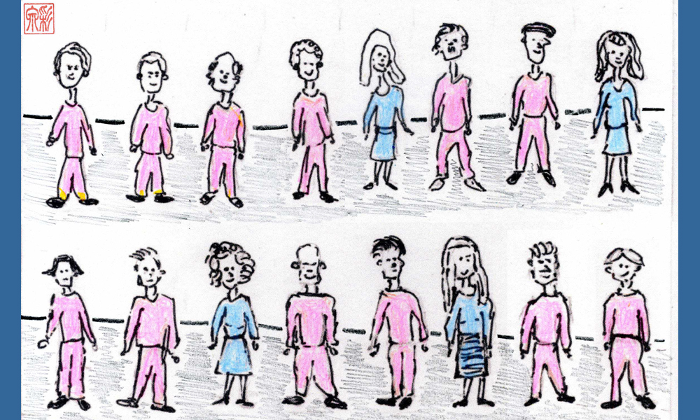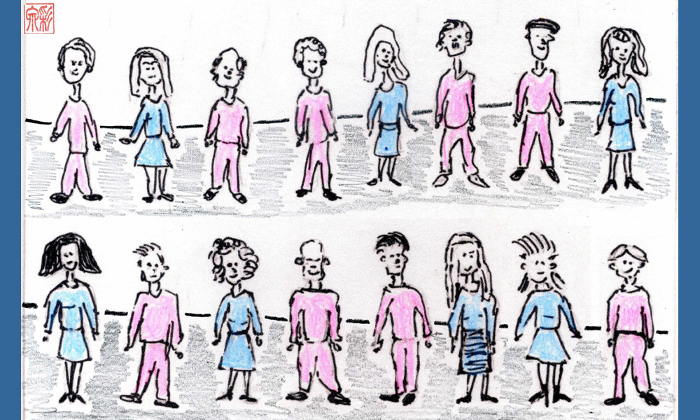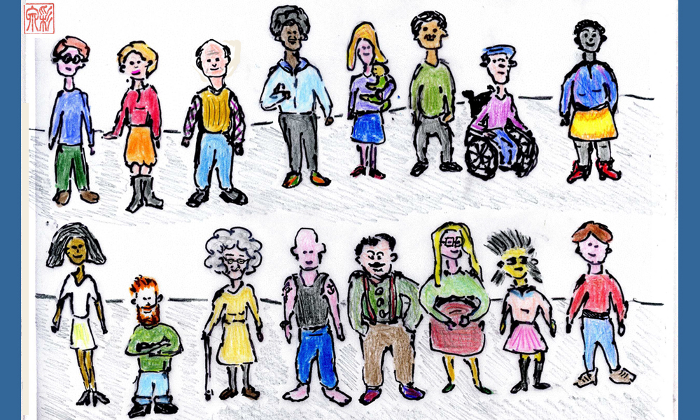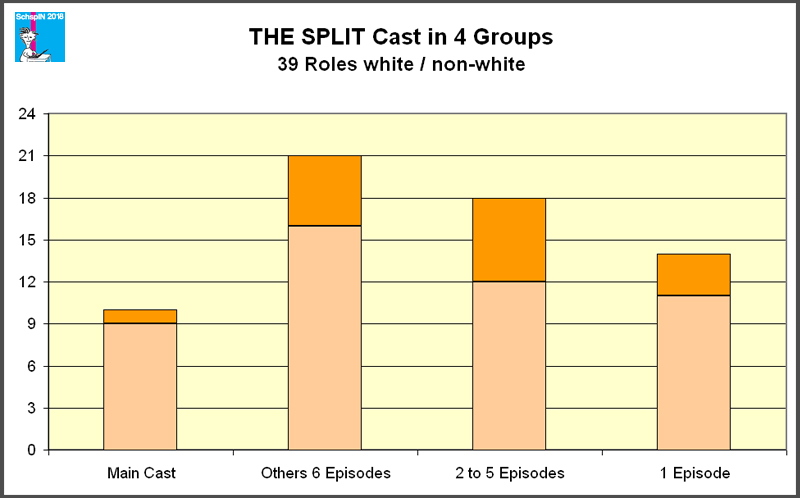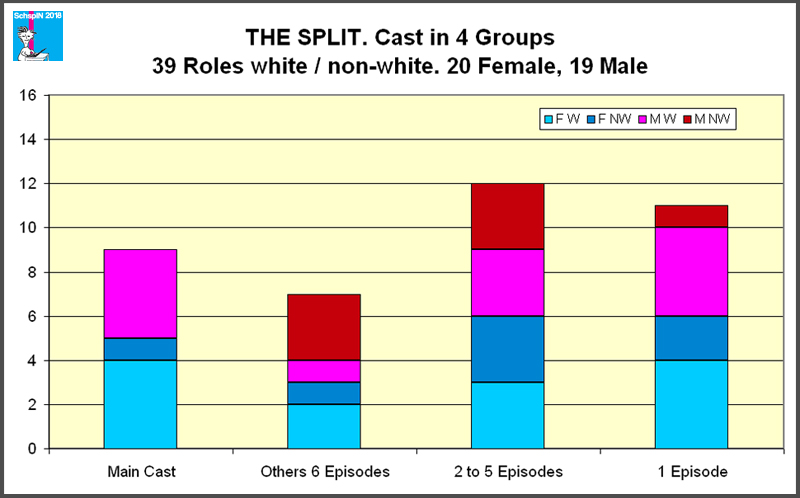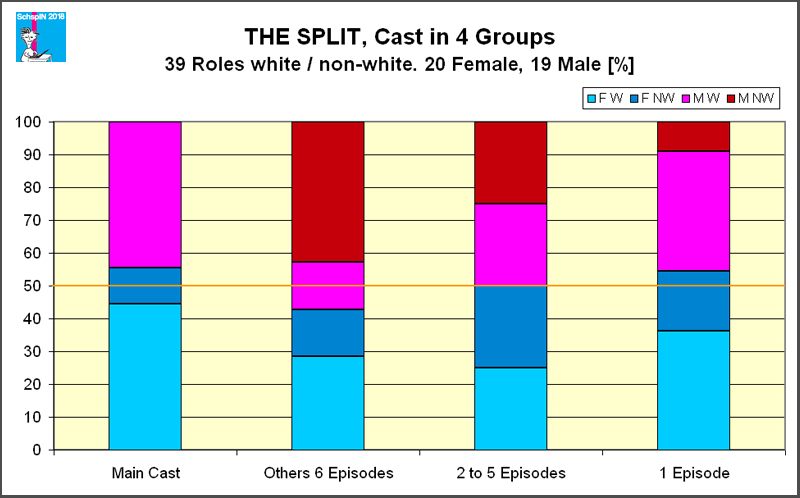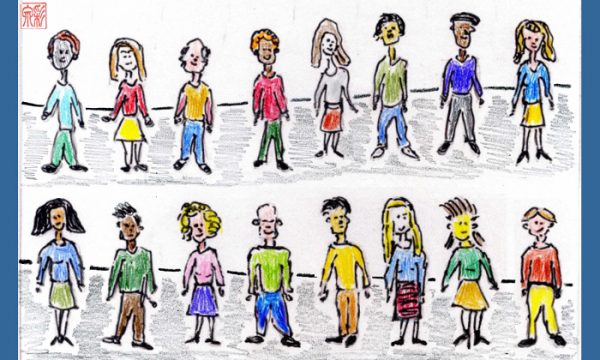Diversifying Casts To See More
Today‘s aricle is about promoting diversity on-screen, NEROPA, the ethnically diverse cast of the British divorce law miniseries THE SPLIT (BBC, 2018) and my colleagues Fiona Rodrigo, James Krishna Floyd and Samir Fuchs.
- Diversity, Reality, Everyday Life
- New Faces
- Gender (Script) and Appearance (Casting)
- It‘s All in The Mind
- THE SPLIT: Equality and Ethnic Diversity
- Catching up with Reality – Three Acters
Diversity, Reality, Everyday Life
Many years ago a casting director put me forward for the role of a nurse, but I was rejected on grounds that that was not what a nurse looked like. Really? If I had become a nurse instead of an actress, then at least one nurse in Germany would have looked like me. “No, but not on television“. Recently I was rejected for the role of a social worker, because of “too old“. Seriously? Do they stop working when they reach fourty?
Not fitting in the picture is something that many acting colleagues, born and raised in Germany like me but with a visible migration background, experience as well, probably more often. “Without an explanation I can‘t just cast you as [role ABC]“. Without explaining what? The perfect Bavarian dialect? A certain profession? The normality?
New Faces
It is imperative to create gender equality onscreen in order to reflect the world in which we live and to inspire us all. It won’t do any more to tell societal, political, social, private, futuristics stories from a male perspective with eternally male biased onscreen ensembles. Actually, this was never alright, but common practice.
Variety not only includes (more than two) genders but also various appearances and differing living realities of people. And they should not only be visible when they are at the centre of a narrative – a blind teacher (PEAS AT 5:30), an accountant of Pakistani heritage (AE FOND KISS), a pregnant woman (ROSEMARY‘S BABY), a deaf young woman (CHILDREN OF A LESSER GOD), an overweight bride (BACHELORETTE) or a struggling unemployed (I, DANIEL BLAKE). They should also appear as supports or even extras – as far as it fits the story. To use the example of a fictionalization of the cardinal convention to elect a pope: there will be younger and (mainly) older men, white or any other colour, fat and slim, wearing glasses or using walkers. But no women. And no openly gays.
However the standard for scripts and especially for casting – not only in Germany – seems to be oriented towards white, young, more or less good-looking, slim, heterosexual women and white, young and old, good-looking to ugly, slim to very fat heterosexual men.
Gender (Script) and Appearance (Casting)
I invented the method NEROPA Neutral Roles Parity to raise the share of female roles in scripts by that simple, non-invasive way of identifying the neutral roles whose – mostly male – gender is not essential for the story. (as a side note: I am not calling for a 50 % female quota or target for every film, but am suggesting a method that can be applied by every production right away and that help – e.g. alongside commissioning new ideas and formats and applying NEROPA during Script Development – shortening the road to gender parity onscreen.)
To further diversify the onscreen characters I suggest as a second step using the NEROPA Finetuning, which is a task for the competent hands or minds of casting directors. Actively, i.e. with an announcement („Do this!“), and with the necessary freedom of action, trusting that they can propose great, varied and exciting casts and ensembles. Because they know all the actresses and actors, not only the broadcasters‘ shortlist of TV faces and a handful of „leading roles suitably“ names.
The next images demonstrate the effects NEROPA can have: Image 1 shows the original male biased situation, image 2 with more female roles as a result of NEROPA (see NEROPA Method), image 3 the roles after casting of actresses and actors (see NEROPA Finetuning).
A few weeks ago I was urged to implement a quota for ethnic diversity into the NEROPA method. As important as I think a wide-ranging representation is, I don‘t think setting up quotas for the characters in a script is the best way. Diversity, including ethnic variety – independent of plots and character breakdowns with specific descriptions – is a question of who is casts, so it‘s the work area of casting directors.
And there is something else that I find is worth a thought: it‘s not only people affected by racism that are underrepresented in film and television, there are so many others, individuals and groups, for example people with disabilities, LOGBTQI, old people, older women, overweight people, socioeconomically poor people and and and. Should they all be worked into the scripts according to their percentage of the population? That seems highly bureaucratic and uncreative. And it is not something that would or could work for every story, every period of time, every setting.
And also, it is quite difficult or even impossible to get different proportional quotas or targets under one roof. I find it quite striking that other than for female directors, there haven‘t really been any concrete demands or suggestions to raise the share of women in other film departments. The model #2v6pN is an attempt in this direction and involves the heads of department for direction, script, DoP, sound, editing and music (see also Germany’s Top Cop Drama TATORT on and off-screen 2011 to 2018). But we definitely need more ideas urgently. Also because raising the share of female directors is not enough and would automatically lead to substantially more female heads of other departments and more female roles.
It’s All in The Mind
A basic question when casting roles without information on appearance, body shape, ethincs etc. in the script could be: “Does this character need to be white, young, good-looking and able-bodied?“ Of course casting directors have already done this from time to time with minor characters, just like they have been gender-switching roles, and producers have been open to this. In NELE IN BERLIN casting director Uwe Bünker cast black Swiss actress Jennifer Mulinde-Schmid as a nurse, both attributes weren‘t in the script. In LAST TANGO IN HALIFAX (casting by Beverley Keogh) there is a lesbian teacher, Kate, in the script. But was she also described as black, or was that something that happened when Nina Sosanya was cast, and they wrote it into the script afterwards? (though I have to say that I only remember one piece of dialogue where this was being talked about).
I can imagine that a production already working with the NEROPA method will also be more open to a more diverse casting. They will be talking about gender-switching and representation, about stereotypes and new images. So theoretically we can assume a readiness to change a few of the male into female roles. It doesn‘t seem a far stretch from this to the order “Please also propose a few people, less common onscreen but very much present in real life”, taking into account the regional setting and period, and if necessary providing data on population etc.
Apparently the situation in the UK seems to differ from ours in German. There casting directors are working mainly autonomously and can decide – with the exception of prominent leading roles – on the actors and actresses. Here in Germany I hear casting directors mention a worsening work situation, less competences, less time, deadlines, less money for auditions and so on, with decisions on final scripts and role lists being available later and later. But it shouldn‘t have to stay this way.
With the necessary backing and willingness in a production a film can be diversified considerably through the casting and so become more modern and more attractive for a larger audience. This also helps avoid stereotyping. If there is only one representative of a group, they are often presented in a clichéd manner. If for example there is a Swedish woman in a British film, chances are relatively high, that she will be cast with a blonde, busty, tall woman. If there are three Swedes, may one of them will have black hair and be an immigrant. Supporting roles also offer another chance: I often see that in films with a person in a wheelchair as the lead, there seems to be a tendency on the negative (how many films do you know where the ones in the wheelchairs want to end their lives?). If it‘s a big or small supporting role in a wheelchair, the registrar, newspaper editor, the neighbour or mother-in-law, we see normality. Because then no tale of woe has been written as their backstory.
THE SPLIT: Equality and Ethnic Diversity
There is an interesting example for a series with strong ethnic representation, it‘s the 6-part-series THE SPLIT (BBC 2018., created and written by Abi Morgan). At the centre there is a family of divorce lawyers. The oldest daughter Hannah (Nicola Walker), married, 3 children, just left the successful family business (Defoe) for a competing enterprise (Noble & Hale). Mother Ruth (Deborah Findlay) and middle daughter Nina (Annabel Scholey) remain at Defoe‘s, Rose (Fiona Button), the youngest, works as a nanny and plans to marry (see BBC website).
The main cast is quite gender-balanced, and we see women of different ages in bigger and smaller roles, there is a female foreign secretary (Claire Rushbrook) and a female PM (mentioned). But what makes this cast stand out is the strong representation of non-whites. Just like that, I would guess. Actually I‘ve tried to find out how this came about, whether the producers issued a guideline or target: Diversity! – Let‘s cast more diverse. Unfortunately, Sister Pictures and casting director Beverley Keogh haven‘t written back to me yet, bus as soon as they reply I will add the information to this article. The only role that was probably written as black might be footballer Diallo Diapo (Thierry Mabonga) who comes to the law firm about a prenuptual agreement.
Otherwise we see Rose Defoe‘s fiancé James Cutler and his parents Annie and Miles, played by Rudi Dharmalingam, Shobu Kapoor and Ahmed Jamal, and vicar Glen Peters (Kobna Holdbrook-Smith). Other non-whites include Hannah‘s colleague / assistentant Maggie Lavelle (Ellora Torchia) and legal assistant (?) Sean Bainbridge (Afolabi Alli) as well as rich businesswomen Goldie McKenzie (Meera Syal) and Jaynie Lee (Tamara Lawrance), and of course Alex ,Zander‘ Hale, head of Noble & Hale (Chukwudi Iwuji). It is not important if he is black, white or brown – and actually, to me „Zander“ sounds a little Dutch, quite contrary to lawyer Christie Carmichael, whose name seems very English and not in the least Dutch. Christie is played by Dutch Barry Atsma und in the dialogues they refer to his nationality a number of times. I find it quite nice by the way, that a foreigner is for once played by a foreigner. The few Germans we see (mot only) in British productions of today – contrasting the many Germans who‘ve come to live and work in London and other British towns – are usually played by British, often with this parody of a German accent, instead of casting German actresses or actors or having them at least dubbed for the German dialogues afterwards. Queen Mary, a German grandmother of Queen Elizabeth II, would have been fluent in German and without an accent – unlike what I heard in the TV series THE CROWN). But that is a topic for another day.
The next diagrams show the share of white and non-white cast (in number and percentage) among the continued and smaller roles, on the whole and broken down for gender. These are quite realistic figures for a series set in London where 44 % of the population belongs to an “ethnic minority“. Und British divorce law is a quite female domain.
However, there‘s not much there when you look for other types of diversity in the cast of THE SPLIT. We can take foreign secretary Emma Graham (Clair Rushbrook) who is quite big in an ensemble of otherwise slim women. There is one pregnant woman (part of the plot) but I don‘t remember anyone with a disability (if we count out people needing glasses), no hint that anybody might be LGBTQI, which would need to appear in the written script – because it‘s not something you make visible by casting a certain actor or actress. Actually, I read there is to be a second series, and if I had to put money on who might turn out to be a homosexual, it would be on Zander Hale, – as we haven‘t learned anything about his private life yet. (Oh, and who is this Noble of Noble & Hale? Different topic).
I also noticed something in the cast which is quite common in Germany as well. When well-known actors / actresses are cast, age logic is overruled. We just had a new German TV series called DIE PROTOKOLLANTIN, where leading actress Iris Berben (b. 1950) and Moritz Bleibtreu (b. 1971) are cast as sister and brother, in flashbacks we see them as children, some 5 or 6 years apart. In THE SPLIT it‘s leading Hannah Stern, oldest of the three sisters. According to the dialogue she is 4 years older than middle sister Nina, in real life actresses Nicola Walker and Annable Schorley are 14 years apart and it shows. Generally speaking, the three sisters don‘t really look very much alike, and also their accents and ways of speaking differ considerably (I have to say, I am a foreigner, so maybe I am completely off there). I have sisters myself and to this day we get mistaken for one another on the phone. But of course, this is not the focus of the series, it works as it is, even without family resemblance. I heard that there were complaints about another BBC series – BODYGUARD – about the high percentage of black or mixed-race actresses and actors. Strange. That series is also set in London.
Catching Up with Reality – Three Acters
Comparing the names of the characters from THE SPLIT with those of the actresses and actors shows that you cannot always guess a person‘s background from their name, and aren‘t our photos and showreels more important than our names anyway?
My colleague Samir Fuchs, whom I met in the German family TV show DSCHERMENI last year (IMDB) – he played a refugee and I the manager of the refugees home – was born and raised in Berlin. Apart from „Berlinerisch“ his mother tongue is German, Samir does not speak the mother tongue of his father who came from Eqypt. Since he looks more like him than like his blonde mother he is never cast as a „Berliner“, but more often than not as an immigrant, as someone who only speaks broken German. Or Arabic. For that he has to work with language and dialect coaches. If he is cast as an accent-free German, there is usually some sort of comment in the dialogue: „But he was born in this country, you know“. I asked him how the industry reactos to his name. Fuchs is German (meaning ‘fox’) and Samir is an Arabian name (meaning ‘conversation partner in the evening’) – but then first names are often international:
Mmhh, atually quite a few people think I use a stage name. I am probably the only one with this name in the whole world. For my work, it‘s actually a Unique Selling Point, easy to remember and from my experience I‘d say, with a positive touch. German casting directors know my work and at least know what to expect visually when I come through a door. What sometimes happens in an audtion is that Herr Fuchs emerges more one moment, and Samir in the next. Like a curse and saviour at the same time. A bit like a hybrid car. You have to know which source of energy you want to use in the moment.
There‘s a British actor whose name was James Floyd, when I saw it for the first time in a film‘s end titles (MY BROTHER THE DEVIL, directed by Sally El Hosaini). On my blog I have actually mentioned him before, he is Dr. Varma in the British TV series THE GOOD KARMA HOSPITAL, set in India, filmed in Sri Lanka, in the article Taking a Shower – The Dramaturgy. Last year James added his second ‘first’ name to his professional name. He kindly gave me permission to quote his statement from Oct 6, 2017 (thank you!):
From today my professional stage name will officially be James Krishna Floyd. This is my full birth name, with my middle name, Krishna, included.
I have done this for many reasons. Here are a few:
When my mum was a teenager she travelled by car, with her family, from Tamil Nadu, South Indian to London, UK. She then stayed in London and has been based there ever since. She met my English dad during Flower Power and the hippie movement of love and acceptance. I am a very proud mixed race human and have many cultural influences in my DNA. But the one thing I am most proud of is being the son of a migrant. (…) If we go back far enough every human comes from migrant blood.
London based English actress Fiona Rodrigo is of Sri Lankan heritage. When I asked her about reactions to her name (Fiona doesn‘t sound Sir Lankan and Rodrigo neither English nor Sri Lankan) she replied:
It has been suggested that I change one or both of my names but mainly Rodrigo because, for example, I have been mistaken for being from South America or parts of the Mediterranean. I love it but it is possible that my name has been preventing the industry from seeing me for South Asian roles when an emphasis has been placed on a very particular definition of authentic casting. I am encouraging the industry to catch up with reality.
Portuguese surnames are not uncommon in Sri Lanka apparently, from where Fiona‘s parents came to England several decades ago. What I also find strange about the reactions she gets is that they focus so much on the name. Also, she could have just changed it through marriage. I asked Fiona how often she auditions for parts that have some or no reference to South Asian appearance in the character breakdown, and if she often has to fake some sort of South Asian accent:
Far more recently the roles have been South Asian specific and have required an accent – both for theatre and screen. A few screen auditions have been for a British or American characters and have not specified any ethnicity and these have been via self-tapes. I love a mix of everything because I am and that is also the world. This is what the world looks like. I can be Sara, Anna or Sharmila. As an actor you want, and expect, to be limitless and play it all.
Fiona added:
Commercials seem to be far wider in the casting. For commercials often I am one of many different ethnic looks in the audition which is great. I usually use my natural accent and there are typically no limits on who I can be.
I’m hoping that self-taping and a continued push for inclusive casting will continue to open this up much more so the overall casting process itself is actively widened and representative of the real world.
See also: Fiona Rodrigo: Do I have to change my name to be seen for South Asian roles? (The Stage, 3.8.18).
I asked Samir about the roles suggested to him: better be an eyes-rolling translator or a terrorist with poor German than no work at all?
Clichés are made by people. Films as a mirror of social conception visualizes them. I made my first fim shortly after 2001. The already stereotypical and negative perception of foreigners has been extremely intensivied since then. At the expense of ethnic or religious groups films and TV series are produced that often reinfoce this perception. As an actor I have a social responsibility and at the same time I have to earn my living. To counteract stereotyped ideas such as „a long beard points to an imminent act of terrorism“ I try to humanize the characters I play in such a way that the audience sees their actions, and maybe condems the individual role, even hates them, but leaves out their ethnical background. At least this is what I try to do. It‘s a small line to walk, especially if the scripts lack a certain depth, I am well aware of that. It is very important to work with good people who are prepared to rewrite parts of a role. So that a „Lebanese crack dealer“ is transformed into a „tax consultant“ who mucks around with the police. Quite the foxy character! (note: Fuchs, Samir‘s surname, is German for fox)
What about working as a dubbing actor, is it mainly Arab characters with heavy accents?
I came to dubbing through a colleague. They were looking for someone who could speak German with an Arabian accent for the wonderful Danish film ADAM‘S APPLES (directed by Anders Thomas Jensen). I went to the auditon and thought that I was terrible, speaking with an accent felt so artificial. Despoite this I got the part. Then I got better known through word of mouth and so I made a virtue out of necessity, trained my Arabic and worked on accents. Nowadays I am booked for dubbing characters with Arabic roots, also because I seem to be understand the original actors better. I have acutally become a specialist for those cases which are too difficult for German tongues, but I also dubb a monk, a literary professor, Marco with long blonde hair and your normal next-door family man.
I‘d like to conclude today‘s article with the rest of James Krishna Floyd‘s statement from Oktober 2017. which spans from his family over current right-wing politics to our responsibility, with a hopeful ending:
But the one thing I am most proud of is being the son of a migrant. My family has always been very active in its support for immigrants and the underclass in UK. From teaching English to refugees to working with young offenders on probation. If we go back far enough every human comes from migrant blood. Yet still today so much of mainstream society condemns immigrants and immigration. From the orange ape that is Trump who rescinds DACA and does everything he can to vilify immigrants, even though his great grandfather was a German immigrant in US. To show business, the industry I’m in, that pats itself on the back every year for handing out crumbs to what it calls ‘minorities’ in the name of ‘diversity’. To the evil brothers of UKIP and Brexit that have duped many Brits into thinking that running away from the (albeit imperfect) global community of EU will benefit our future generations. To the Alt-Right movement being anything but alternative and frequently wrong, especially on immigration. I could go on but I wont. I am not religious but Krishna was a Hindu God of many things, especially compassion. I hope in some tiny way, my new stage name can communicate this. We must have compassion for the migrant journey. It’s where we all come from.
Peace and Love, James Krishna Floyd

